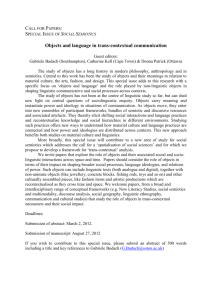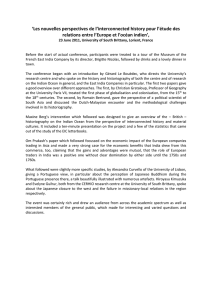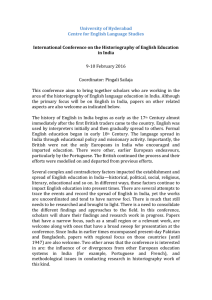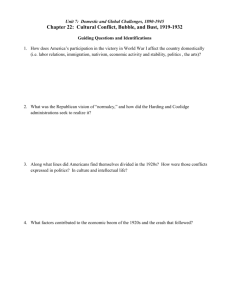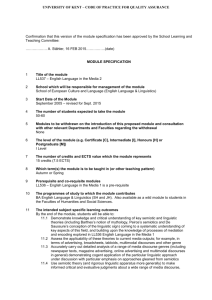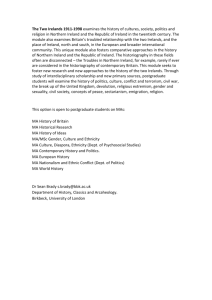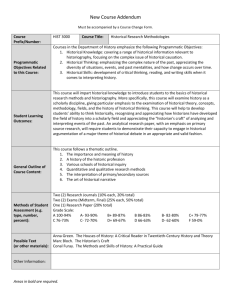File
advertisement
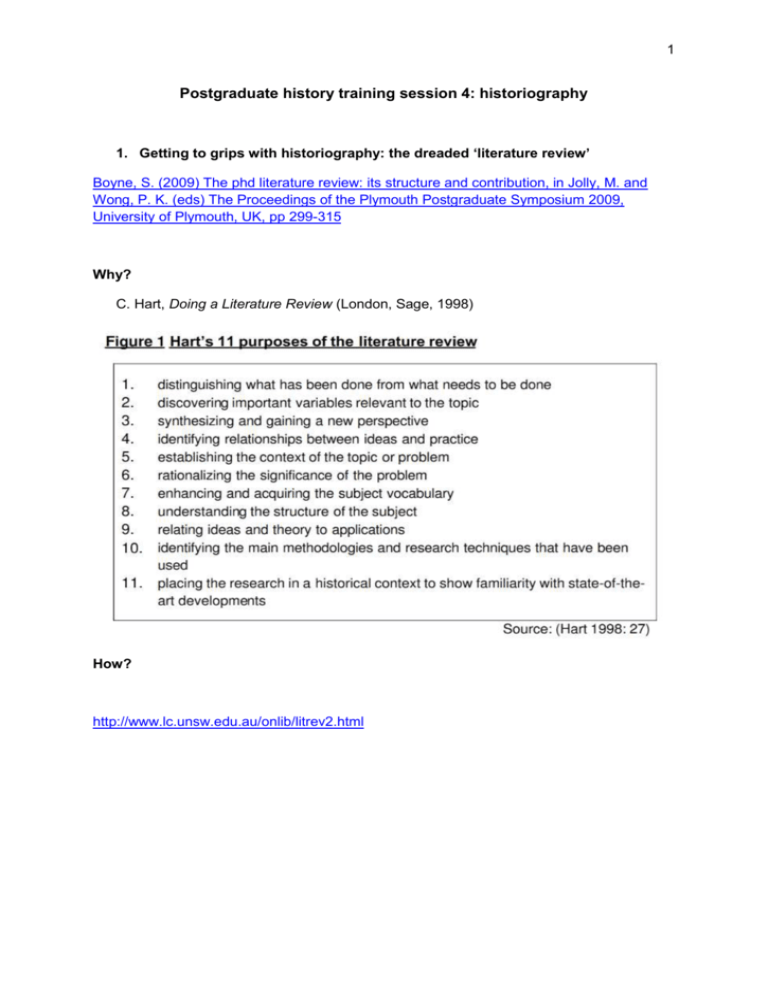
1 Postgraduate history training session 4: historiography 1. Getting to grips with historiography: the dreaded ‘literature review’ Boyne, S. (2009) The phd literature review: its structure and contribution, in Jolly, M. and Wong, P. K. (eds) The Proceedings of the Plymouth Postgraduate Symposium 2009, University of Plymouth, UK, pp 299-315 Why? C. Hart, Doing a Literature Review (London, Sage, 1998) How? http://www.lc.unsw.edu.au/onlib/litrev2.html 2 R Carnwell and W Daily, ‘Strategies for the construction of a critical review of the literature’, Nurse Education in Practice, 1: 2 (2001) 3 2. Historiographical trends: a) Whig History T. B. Macaulay, History of England (1866) - Progression thesis – gradual development to the better - Liberal democracy as the goal Structural – especially the state, constitutional high politics, economy Anglo-centric Revival in state-centred works – e.g. John Brewer, The Sinews of Power: War, Money and the English State, 1688-1783 (1990) and J. C. D. Clark, English Society, 1660-1832 (1985). b) Gender history From feminist history – ‘herstory’ – often influenced by Marxist historiography, emphasis on patriarchal control of women in history and patriarchal view by historians To gender history – history of femininity and masculinity, ‘separate spheres’ question History of sexuality moved from queer history with an agenda to more ‘neutral’ history The curse of Judith Butler, Gender Trouble (1990) 4 EVANS, Mary, 'Doing gender: Gender and women's studies in the twenty first century', Women's Studies International Forum, 34:6 (2011) 603-610 c) from economic/high political to social/cultural history In Practicing History: New Directions In Historical Writing After The Linguistic Turn, edited by Gabrielle M. Spiegel (2005), p. 38 - d) ‘turns’ – linguistic, cultural, material, spatial Key elements: - ‘we are all cultural historians now’ Semiotics and symbolism Post-structuralism – focus on agency or power of text/culture/space rather than big structures of economics/state/politics, avoid teleology or ‘progressive’ narratives Relativist – no one narrative Linguistic turn: - Is all the world a text? Begun by a non-postmodernist, Gareth Stedman Jones, Languages of Class (1983) Agency of language – language as power Debate in Social History and Past & Present in late 1980s/early 1990s Post-structuralist – relativism – no truth Burned out by late 1990s Cultural turn: - Is all the world culture? Agency of culture – culture as power 5 Hunt, L., The New Cultural History (1989) WALTON, John K., 'New Directions in British Historiography : the Emergence of Cultural History', Revue française de civilisation britannique, 14:4 (2007) 33-44 Material turn: - Is all the world material? Emphasis on material culture and objects From ‘history of stuff’ to the semiotics of ‘stuff’ Spatial turn: - Is all the world a space? Semiotics of space; space as power and agency Influenced by Edward Soja, Lefebvre, Michel De Certeau, David Harvey, and other philosophers/sociologists as well as by cultural geography We will be returning to these turns in a later session, but see my ‘Why I am tired of turning’ http://www.historyworkingpapers.org/?page_id=225 e) the 'memory boom' - especially WWI and WWII studies, but also genocide studies etc. focus on memory of survivors but also on commemoration – heritage oral histories some post-structuralism: memory is constructed as a cultural representation rather than as an objective ‘store’ of past ‘reality’ shaped and constructed by ritual and commemoration shaping of memory in and after wars was a crucial part of government attempts to formulate new national identities, but constructed memories could be contested from below memory fatigue? – as argued by Jay Winter, critic of the memory boom Stefan Goebel, The Great War and Medieval Memory: War, Remembrance and Medievalism in Britain and Germany, 1914–1940 (Cambridge, 2007) Iain Robertson and Tim Hall, ‘Memory, Identity and the Memorialisation of Conflict in the Scottish Highlands’, in Niamh Moore and Yvonne Whelan, eds, Heritage, Memory and the Politics of Identity (Aldershot, 2007), pp. 19-36. Eric Langenbacher and Friederike Eigler, ‘Memory Boom or Memory Fatigue in 21st Century Germany?’ German Politics and Society 23: 3 (Fall 2005), 1-15 6 Jay Winter, Remembering War: the Great War Between Memory and History in the Twentieth Century (New Haven, 2006) Journal of Social History, special issue, Vol. 44, No. 4 (summer 2011) Susannah Radstone, 'Reconceiving Binaries: the Limits of Memory', History Workshop Journal 59(1) (Spring 2005)
